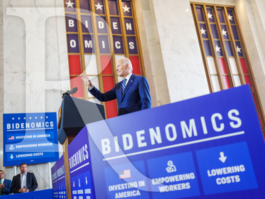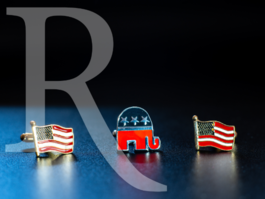Nearly Two-Thirds Favor Ending ‘Corporate Welfare’
At a time when voters are deeply divided on many issues, they are overwhelmingly united in their opposition to government subsidies for business.
A new national telephone and online survey by Rasmussen Reports and the Woodford Foundation finds that 64% of Likely U.S. voters favor ending “corporate welfare,” and believe government should not give handouts to businesses. Only 20% disagree, while another 16% are not sure. These findings have changed only slightly since September 2022. (To see survey question wording, click here.)
There is almost no partisan difference on this issue. Sixty-five percent (63%) of Republicans support ending “corporate welfare,” as do 64% of both Democrats and voters not affiliated with either major party.
A solid majority (57%) of voters also agree that taxes and government spending should be cut 50% or more. Thirty-two percent (31%) disagree and 12% are not sure. More Republicans (72%) than Democrats (46%) or unaffiliated voters (54%) favor such a proposal.
(Want a free daily e-mail update? If it’s in the news, it’s in our polls). Rasmussen Reports updates are also available on Twitter or Facebook.
The survey of 1,178 U.S. Likely Voters was conducted on January 17, 2024 by Rasmussen Reports and The Woodford Foundation. The margin of sampling error is +/- 3 percentage points with a 95% level of confidence. Field work for all Rasmussen Reports surveys is conducted by Pulse Opinion Research, LLC. See methodology.
Another popular proposal, favored by 54% of voters, is to maintain Department of Defense spending at 4% of Gross Domestic Product. Twenty-two percent (22%) disagree and 24% are not sure. Sixty-two percent (59%) of Republicans, and 51% of both Democrats and unaffiliated voters, favor this idea.
Among other findings of the Rasmussen Reports/Woodford Foundation survey:
– A plurality (46%) think Obamacare should be repealed, while 42% disagree and 12% are not sure. Voters ages 30-39 support repealing Obamacare by a 10-point margin, 48% to 38%. Men (51%) are significantly more likely than women voters (42%) to support the repeal of Obamacare. Forty-eight percent (46%) of whites, 39% of black voters, 52% of Hispanics and 51% of other minorities support repealing Obamacare. Sixty-six percent (66%) of Republicans, 30% of Democrats and 42% of unaffiliated voters favor repealing Obamacare.
– Fifty-two percent (52%) of voters believe government should do much less, and allow people to work things out voluntarily among themselves. Thirty-five percent (35%) disagree and 12% are not sure. Seventy-two percent (72%) of Republicans, 39% of Democrats and 47% of unaffiliated voters agree.
– Forty-four percent (44%) believe people should be able to control their own retirement and Social Security should be privatized. Forty-one percent (41%) disagree and 15% are not sure. Privatizing Social Security is most popular among voters under 50.
– Thirty-eight percent (38%) agree that global warming is not a threat to the world, but 55% disagree. A majority (55%) of Republicans don’t see global warming as a threat to the world, but majorities of both Democrats (67%) and unaffiliated voters (55%) think global warming is a threat.
– Only 24% believe Health Savings Accounts should replace Medicare and Medicaid, while 58% disagree.
– Most voters disagree with proposals to eliminate the federal Education Department and Agriculture Department, and 58% disagree with repealing the Endangered Species Act.
In general, voters who are married with children are most in favor of proposals to reduce the size and expense of government. For example, on the question of whether taxes and government spending should be reduced by 50%, married-with-children voters agree by more than a 2-to-1 margin, 62% to 25%.
By a wide margin, more voters say “Bidenomics” will help Donald Trump in the 2024 presidential campaign than believe it will help Joe Biden win reelection.
Despite former President Donald Trump’s wide lead over his Republican challengers, most voters believe it’s too early for his rivals to quit.
Additional information from this survey and a full demographic breakdown are available to the public as well as to Platinum Members.
Please sign up for the Rasmussen Reports daily e-mail update (it’s free) or follow us on Facebook. Let us keep you up to date with the latest public opinion news.
The survey of 1,178 U.S. Likely Voters was conducted on January 17, 2024 by Rasmussen Reports and the Woodford Foundation. The margin of sampling error is +/- 3 percentage points with a 95% level of confidence. Field work for all Rasmussen Reports surveys is conducted by Pulse Opinion Research.
Rasmussen Reports is a media company specializing in the collection, publication and distribution of public opinion information.
We conduct public opinion polls on a variety of topics to inform our audience on events in the news and other topics of interest. To ensure editorial control and independence, we pay for the polls ourselves and generate revenue through the sale of subscriptions, sponsorships, and advertising. Nightly polling on politics, business and lifestyle topics provides the content to update the Rasmussen Reports web site many times each day. If it's in the news, it's in our polls. Additionally, the data drives a daily update newsletter and various media outlets across the country.
Some information, including the Rasmussen Reports daily Presidential Tracking Poll and commentaries are available for free to the general public. Subscriptions are available for $4.95 a month or 34.95 a year that provide subscribers with exclusive access to more than 20 stories per week on upcoming elections, consumer confidence, and issues that affect us all. For those who are really into the numbers, Platinum Members can review demographic crosstabs and a full history of our data.
To learn more about our methodology, click here.





